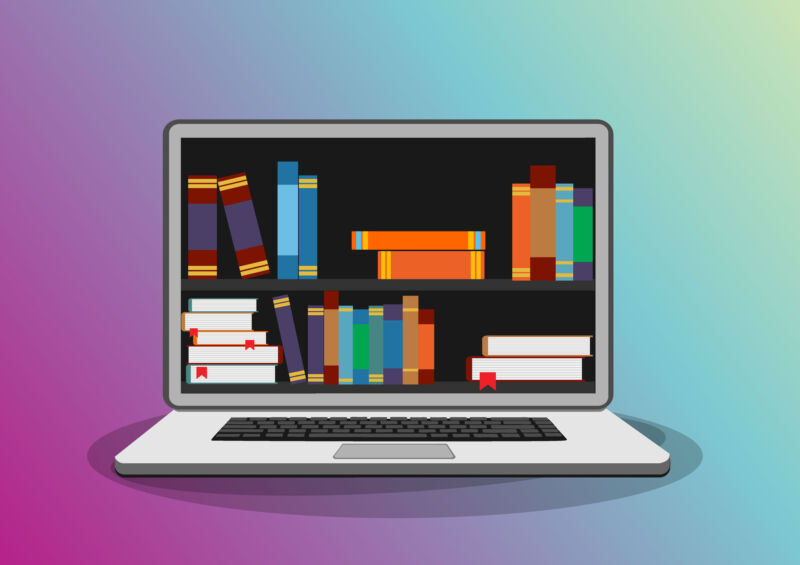Appeals court seems lost on how Internet Archive harms publishers

The Internet Archive (IA) went before a three-judge panel Friday to defend its open library’s controlled digital lending (CDL) practices after book publishers last year won a lawsuit claiming that the archive’s lending violated copyright law.
In the weeks ahead of IA’s efforts to appeal that ruling, IA was forced to remove 500,000 books from its collection, shocking users. In an open letter to publishers, more than 30,000 readers, researchers, and authors begged for access to the books to be restored in the open library, claiming the takedowns dealt “a serious blow to lower-income families, people with disabilities, rural communities, and LGBTQ+ people, among many others,” who may not have access to a local library or feel “safe accessing the information they need in public.”
During a press briefing following arguments in court Friday, IA founder Brewster Kahle said that “those voices weren’t being heard.” Judges appeared primarily focused on understanding how IA’s digital lending potentially hurts publishers’ profits in the ebook licensing market, rather than on how publishers’ costly ebook licensing potentially harms readers.
However, lawyers representing IA—Joseph C. Gratz, from the law firm Morrison Foerster, and Corynne McSherry, from the nonprofit Electronic Frontier Foundation—confirmed that judges were highly engaged by IA’s defense. Arguments that were initially scheduled to last only 20 minutes stretched on instead for an hour and a half. Ultimately, judges decided not to rule from the bench, with a decision expected in the coming months or potentially next year. McSherry said the judges’ engagement showed that the judges “get it” and won’t make the decision without careful consideration of both sides.
“They understand this is an important decision,” McSherry said. “They understand that there are real consequences here for real people. And they are taking their job very, very seriously. And I think that’s the best that we can hope for, really.”
On the other side, the Association of American Publishers (AAP), the trade organization behind the lawsuit, provided little insight into how the day went. When reached for comment, AAP simply said, “We thought it was a strong day in court, and we look forward to the opinion.”
Decision could come early fall
According to Gratz, most of the questions for IA focused on “how to think about the situation where a particular book is available” from the open library and also available as an ebook that a library can license. Judges said they did not know how to think about “a situation where the publishers just haven’t come forward with any data showing that this has an impact,” Gratz said.
One audience member at the press briefing noted that instead judges were floating hypotheticals, like “if every single person in the world made a copy of a hypothetical thing, could hypothetically this affect the publishers’ revenue.”
McSherry said this was a common tactic when judges must weigh the facts while knowing that their decision will set an important precedent. However, IA has shown evidence, Gratz said, that even if IA provided limitless loans of digitized physical copies, “CDL doesn’t cause any economic harm to publishers, or authors,” and “there was absolutely no evidence of any harm of that kind that the publishers were able to bring forward.”
McSherry said that IA pushed back on claims that IA behaves like “pirates” when digitally lending books, with critics sometimes comparing the open library to illegal file-sharing networks. Instead, McSherry said that CDL provides a path to “meet readers where they are,” allowing IA to loan books that it owns to one user at a time no matter where in the world they are located.
“It’s not unlawful for a library to lend a book it owns to one patron at a time,” Gratz said IA told the court. “And the advent of digital technology doesn’t change that result. That’s lawful. And that’s what librarians do.”
In the open letter, IA fans pointed out that many IA readers were “in underserved communities where access is limited” to quality library resources. Being suddenly cut off from accessing nearly half a million books has “far-reaching implications,” they argued, removing access to otherwise inaccessible “research materials and literature that support their learning and academic growth.”
IA has argued that because copyright law is intended to provide equal access to knowledge, copyright law is better served by allowing IA’s lending than by preventing it. They’re hoping the judges will decide that CDL is fair use, reversing the lower court’s decision and restoring access to books recently removed from the open library. But Gratz said there’s no telling yet when that decision will come.
“There is no deadline for them to make a decision,” Gratz said, but it “probably won’t happen until early fall” at the earliest. After that, whichever side loses will have an opportunity to appeal the case, which has already stretched on for four years, to the Supreme Court. Since neither side seems prepared to back down, the Supreme Court eventually weighing in seems inevitable.
McSherry seemed optimistic that the judges at least understood the stakes for IA readers, noting that fair use is “designed to ensure that copyright actually serves the public interest,” not publishers’. Should the court decide otherwise, McSherry warned, the court risks allowing “a few powerful publishers” to “hijack the future of books.”
When IA first appealed, Kahle put out a statement saying IA couldn’t walk away from “a fight to keep library books available for those seeking truth in the digital age.”
https://arstechnica.com/?p=2034435